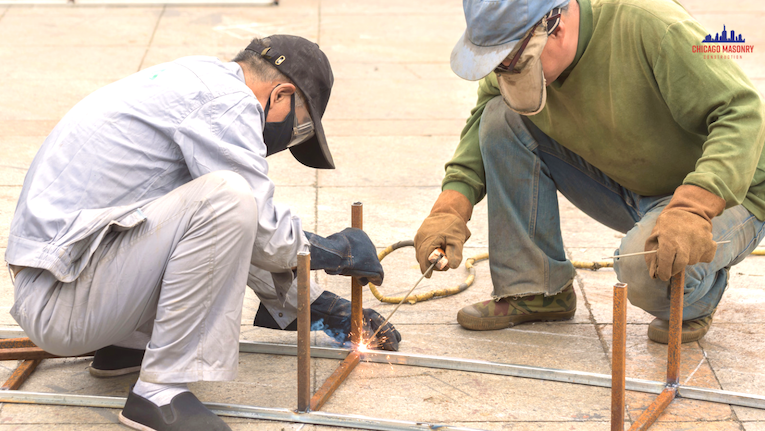Those working in construction are as anxious as any field to get back to work as states across the U.S. begin to open up again these weeks of summer 2020. While construction has been deemed an essential industry in many states, including in Illinois, there have been significant disruptions in the industry since March, with material production slower and office staff all working from home.
However, returning to the masonry construction job sites means more than just opening the gates. Now that businesses are slowly opening again, even here in Illinois, there are of course new safety precautions that must be in place to ensure workers remain safe and avoid another interruption of business continuity.
Of course, masonry construction is always an industry where safety is paramount, but now additional protocols must be in place. Communication will be key to your business’s success as you navigate working during COVID-19. As you implement recommendations from the Center for Disease Control (CDC) and Occupational Safety and Health Administration (OSHA), you’ll want to assure your workers and clients that you are taking all necessary safety precautions. You’ll also want to be proactive about any possible job delays to avoid confusion and frustration.
Following are 7 considerations for construction companies as the economy starts to reopen during COVID-19.
- Determine new safety and hygiene protocols: Warn workers to stay home if they aren’t feeling well and consider taking everyone’s temperature upon arrival each day. In addition to all the usual porta-potties on a construction job site, every site will need additional sanitation stations and a policy on washing hands upon entering the job sites and before and after touching frequently used surfaces. Of course, construction workers normally wear masks for many aspects of the job, employees are accustomed to taking them on and off around the site. Now it’s more important than ever that all workers are committed to leaving masks on when standing within in 6-ft. of others. You’ll also need to sanitize the workspace regularly.
- Social distance on the masonry construction job site: To minimize site exposure and avoid job site crowding, consider limiting the number of workers you need on-site at one time. Splitting workers into A and B teams and then scheduling them at separate times can minimize exposure. Project managers can schedule trades on a staggered basis for social distancing and prevent crowding by establishing one-way stairs and hallways. This will mean slower project completion times, but proceeding with caution is key to worker safety staying open.
- Reassess job timelines and plan for delays: While it’s tempting to just back into work, it’s important to manage the expectations of your clients and other contractors on the building projects. No doubt the production of masonry material you need for jobs you’ve already lined up has been interrupted with the economy closed over the past two months. And jobs that were scheduled for the coming months may be backed up as you catch up on this spring’s work. Everyone will be understanding in the beginning, of course, but it’s important to reset expectations now for interruptions that are likely to continue for months.
- Evaluate and communicate employee benefits: Make sure your policies adequately support your employees on and off the job so that employees don’t feel pressure to show up for work sick. You’ll need to address leave, pay, transportation, childcare, union responsibilities and other human resource issues.
- Focus on communication: Communication with your construction crew and clients is more necessary than ever to successfully do business now. Both will want to hear from you that you are taking all the safety precautions necessary now. And if job timelines have to change mid-project, everyone affected will need to know right away. Putting a communication plan in place will help ensure you don’t have frustrated clients and team members in the future. This also means communicating realistic timelines and contingency plans at the start of projects.
- Understand current OSHA requirements: OSHA recordkeeping requirements at 29 CFR Part 1904 mandate covered employers record certain work-related injuries and illnesses on their OSHA 300 log. COVID-19 can be a recordable illness if a worker is infected because of performing their work-related duties. However, employers are only responsible for recording cases of COVID-19 if certain qualifications are met. Click here for more.
- Know your liabilities. COVID-19 has brought new insurance concerns for businesses as business interruption due to a pandemic isn’t typically covered by insurance. Speak to your broker about possible liabilities if workers are confirmed to be infected on the job.
CMC is hard at work on the construction site. Contact us to get a quote on your next project.
